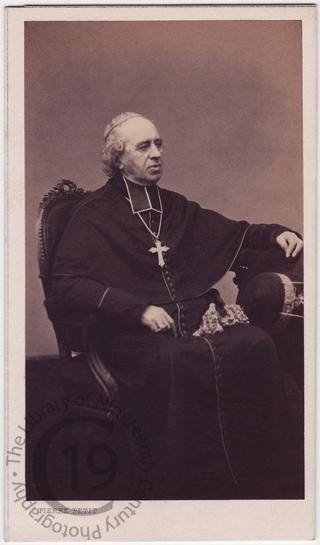
Cardinal de Bonald
Born at Millau in 1787, Louis-Jacques-Maurice de Bonald was the fourth son of celebrated statesman and philosopher the Vicomte de Bonald. Destined for the Church, he studied at Saint-Sulpice and was ordained a priest in 1811. He was first attached to the Imperial chapel and after the Restoration went to Rome as secretary to Archbishop de Presigny, who was entrusted by Louis XVIII with the task of arranging for a new Concordat. When the diocese of Puy was re-established in 1823, Bonald became its first bishop and remained there for sixteen years, until his promotion to the See of Lyons in 1839. In 1841 Pope Gregory XVI made him a cardinal.
The Catholic Encyclopaedia describes Cardinal de Bonald as ‘one of the glories of the French episcopate’. His pastoral letters show him to have been pious, sympathetic, eloquent and full of zeal. Doctrinally, he contributed a large share to the final eradication of Gallicanism and Jansenism. He always took a great interest in social questions, and was never more eloquent than when appealing for help on behalf of misery, as for instance during the floods of 1840 and 1846 and the destitution of the Spanish refugees of 1842. When silk factories in Lyons were closed, he showed not only his generosity towards the needy, but also his broad sympathy for the working class in general. The mainspring of Cardinal de Bonald's life, however, was his love of the Church, which he desired first and foremost to have respected. At a national level, he was a staunch supporter of the Church’s involvement in the education system, while at an internationally, he threw the whole weight of his influence behind the Roman pontiff and the independence of the Holy See.
Cardinal de Bonald died at Lyons on 25 February 1870.
Photographed by Pierre Petit of Paris.
Code: 123394




